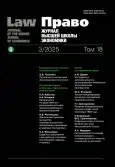Regulating Working Hours of Digital Platform Workers: from Legal Gaps to Algorithmic Solutions
- Authors: Novikov D.1
-
Affiliations:
- Saint Petersburg State University
- Issue: Vol 18, No 3 (2025)
- Pages: 56-80
- Section: Russian Law: Condition, Perspectives, Commentaries
- URL: https://journal-vniispk.ru/2072-8166/article/view/318082
- DOI: https://doi.org/10.17323/2072-8166.2025.3.56.80
- ID: 318082
Cite item
Full Text
Abstract
Digital platforms by shaping the labor market of the platform economy create legal challenges to the regulation of working time, exacerbated by the inefficiency of traditional labor laws. The formal autonomy of platform workers masks algorithmic control, whereby the absence of fixed shifts is combined with dependence on the prescriptions and algorithms of platforms. The legal ambiguity of working hours on digital platforms, mixing active activity with periods of online availability, leaves workers unprotected against digital control and exploitation. The theoretical concept of connection time is proposed as a way to overcome the problems of platform-based forms of working time allocation and the practical inefficiency of the classical approach to the normative regulation of working time. The concept of connection time recognizes that the mere fact of being connected to a platform forms a compulsory measure of work that limits worker autonomy. Connection time integrates active and passive modes of online accessibility into a unified legal construct. Active connection time related to the performance of labor tasks is understood through limits of duration and payment guarantees, while passive connection time (waiting for orders, maintaining ratings, readiness for tasks) is recognized as a labor activity requiring compensation for labor readiness, limiting personal autonomy. It is proposed to include the time of connection into the legal field by setting: the maximum duration of periods of online availability per day/week; minimum payment for the time of connection, even in the absence of active tasks; guarantees of rest, excluding continuous involvement in work. It is noted that the legal innovations proposed in the study are insufficient without implementation of technological approach: the state needs to introduce algorithmic regulation and monitoring systems to automate control over connectivity time. The institutionalization of connectivity time will transform abstract norms into enforceable rules, eliminating the asymmetry of risks between platforms and workers, as well as establishing the regulatory subjectivity of the state in a platform economy.
About the authors
Denis Novikov
Saint Petersburg State University
Author for correspondence.
Email: d.novikov@spbu.ru
ORCID iD: 0000-0003-2727-5357
Candidate of Sciences (Law), Associate Professor.
7–9 Universitetskaya Embankment, Saint Petersburg 199034, Russia.References
Supplementary files








